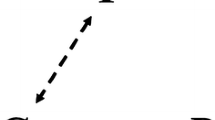Abstract
I distinguish three theses associated with the new mechanistic philosophy—concerning causation, explanation and scientific methodology. Advocates of each thesis are identified and relationships among them are outlined. I then look at some recent work on natural selection and mechanisms. Framing that debate in terms of different kinds of New Mechanism significantly affects what is at stake.

Similar content being viewed by others
Notes
Nicholson (2012) also recognizes three kinds of Mechanist views. There are some similarities to my discussion, but Nicholson’s approach is both more historical and more polemical.
Glennan, it should be noted, is not averse to counterfactuals. Indeed, over time he has incorporated into his account some central elements of Woodward’s (2003) theory.
Machamer et al. (2000) use the language of “production”, but in a largely non-committal way. In a short subsection (3.1) they hint at a deflationary attitude. In any event, as I explain in more detail below, the goal of MDC’s paper isn’t to give an account of causation.
This is not to say that Glennan does not believe in EM. Indeed he develops a version of it himself (Glennan 2005). But as I read Glennan, the first order of business for him is providing a mechanistic account of causation. I return to this below, in my discussion of the relation between different kinds of Mechanism.
There is no tension between this point and the earlier claim that EM shuns law-based explanation. The former has to do with the explanans; the latter concerns explananda.
For instance: “In many fields of science what is taken to be a satisfactory explanation requires providing a description of a mechanism." (MDC 2000, 1). And: “Whether it is geology or molecular biology, biochemistry or cosmology, what is taken to be a causal explanation often consists of the description of a mechanism.” (Tabery 2009, 1). And also: “In many areas of science, explanations are said to be adequate to the extent, and only to the extent, that they describe the causal mechanisms that maintain, produce, or underlie the phenomenon to be explained, the explanandum phenomenon.” (Kaplan and Craver 2011, 601).
Skipper and Millstein do indeed speak of natural selection in causal terms throughout. They describe their schematic graphic as “laying bare the causal crux of selection” (2005, 329).
Skipper and Millstein speak in terms of explanation at several points in the paper, but they never quite say whether they regard explanation-talk as different from causation-talk and if so, how.
Skipper and Millstein’s discussion does not make explicit reference to methods and strategies. But their choice to represent natural selection in graphic form—a relatively unusual attempt—suggests that such issues are in the back of their minds.
References
Barros DB (2009) Natural selection as a mechanism. Philos Sci 75(3):306–322
Bechtel W (2006) Discovering cell mechanisms: the creation of modern cell biology. Cambridge University Press, Cambridge
Bechtel W, Abrahamsen A (2005) Explanation: a mechanist alternative. Stud Hist Philos Biol Biomed Sci 36:421–441
Bechtel W, Richardson RC (1993/2010) Discovering complexity: decomposition and localization as strategies in scientific research. University Press, Princeton
Bogen J (2004) Analyzing causality: the opposite of counterfactual is factual. Int Stud Philos Sci 18(1):3–26
Craver CF (2007) Explaining the brain: mechanisms and the mosaic unity of neuroscience. Oxford University Press, NY
Craver CF, Bechtel W (2006) Mechanism. In: Dubitzky E et al (eds) Encyclopedia of systems biology. Springer, New York
Darden L (2006) Reasoning in biological discovery. Cambridge University Press, Cambridge
Glennan S (1996) Mechanisms and the nature of causation. Erkenntnis 44:49–71
Glennan S (2002) Rethinking mechanistic explanation. Philos Sci 69:S342–S353
Glennan S (2005) Modeling mechanisms. Stud Hist Philos Sci C 36(2):443–464
Glennan S (2010) Mechanisms, causes and the layered model of the world. Phil Phenomenol Res 81:362–381
Godfrey-Smith P (2001) Three kinds of adaptationism. In: Orzack SH, Sober E (eds) Adaptationism and optimality. Cambridge University Press, Cambridge
Hall N (2004) Two concepts of causation. In: Collins J, Hall N, Paul LA (eds) Causation and counterfactuals. MIT Press, Cambridge
Havstad J (2011) Problems for mechanism & natural selection. Philos Sci 78(3):512–523
Hempel CG (1965) Aspects of scientific explanation. Free Press, New York
Kaplan D, Carver CF (2011) The explanatory force of dynamical and mathematical models in neuroscience: a mechanistic perspective. Phil Sci 78(4):601–627
Levy A (forthcoming) Against the ontic conception of explanation
Lewis D (1986) Causal explanation. In Lewis D (ed) Philosophical Papers Vol. II. Oxford University Press
Machamer P (2004) Activities and causation: the metaphysics and epistemology of mechanisms. Int Stud Philos Sci 18(1):27–39
Machamer P, Darden L, Craver CF (2000) Thinking about mechanisms. Philos Sci 67:1–25
Matthen M, Ariew A (2002) Two ways of thinking about fitness and natural selection. J Philos 99(2):55–83
Matthewson J, Calcott B (2011) Mechanistic models of population-level phenomena. Biol Philos 26(5):737–756
Nicholson DJ (2012) The concept of mechanism in biology. Stud Hist Philos Sci Part C 43(1):152–163
Pâslaru V (2009) Ecological explanation between manipulation and mechanism description. Philos Sci 76(5):821–837
Reisman K, Forber P (2005) Manipulation and the causes of evolution. Philos Sci 72(5):1113–1123
Salmon W (1984) Scientific explanation and the causal structure of the world. Princeton: Princeton University Press
Salmon WC (1989) Four decades of scientific explanation. In: Kitcher P, Salmon WC (eds) Scientific explanation. University of Minnesota Press, Minneapolis
Skipper R, Millstein R (2005) Thinking about evolutionary mechanisms: natural selection. Stud Hist Philos Biol Biomed Sci 36:327–347
Strevens M (2006) Scientific explanation. In: Borchert DM (ed) Encyclopedia of philosophy, 2nd edn. Macmillan Reference USA, Detroit
Strevens M (2008) Depth: an account of scientific explanation. Harvard University Press, Cambridge
Tabery J (2009) Difference mechanisms: explaining variation with mechanisms. Biol Philos 24(5):645–664
Walsh DM (2010) Not a sure thing: fitness, probability, and causation. Philos Sci 77(2):147–171
Waskan J (2011) Mechanistic explanation at the limit. Synthese 183(3):389–408
Wimsatt W (1986) Forms of aggregativity. In: Donagan A, Perovich AN, Michael VW (eds) Human nature and natural knowledge. Reidel, Dordrecht
Woodward J (2003) Making things happen: a theory of causal explanation. Oxford University Press, Oxford
Woodward J (2004) Counterfactuals and causal explanation. Int Stud Philos Sci 18(1):41–72
Woodward J (2009) Scientific explanation. In: Edward NZ (2009) The stanford encyclopedia of philosophy, http://plato.stanford.edu/archives/fall2009/entries/scientific-explanation/
Woodward J (2011) Mechanisms revisited. Synthese 183(3):409–427
Acknowledgments
Jens Harbecke provided insightful comments on an earlier version of the paper. Written comments from an anonymous referee for this journal, as well as the editor, were very helpful and I am grateful to them.
Author information
Authors and Affiliations
Corresponding author
Additional information
My title and some terminological choices gesture at Peter Godfrey-Smith’s (2001) paper “Three kinds of Adaptationism”. The topics are unrelated, but the aims are analogous.
Rights and permissions
About this article
Cite this article
Levy, A. Three kinds of new mechanism. Biol Philos 28, 99–114 (2013). https://doi.org/10.1007/s10539-012-9337-z
Received:
Accepted:
Published:
Issue Date:
DOI: https://doi.org/10.1007/s10539-012-9337-z




